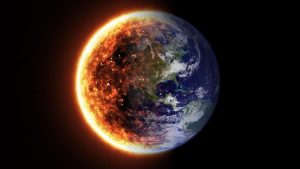A global BBC analysis has found that the number of extremely hot days every year when the temperature reaches 50C has doubled since the 1980s. It also revealed that it is happening in more areas across the world than before, presenting unprecedented challenges to human health and to how we live.
Between 1980 and 2009, temperatures passed 50C about 14 days a year and it has increased to 26 days a year between 2010 and 2019. In the same period, temperatures of 45C and above occurred on average an extra two weeks a year.
Climate change-driven disasters killed 2 million people in last 50 years: UN
Dr Friederike Otto, associate director of the Environmental Change Institute at the University of Oxford, told BBC this increase is only because of the burning of fossil fuels and the extreme temperatures will be more likely in the future. It can be deadly for humans and nature, and cause major problems to buildings, roads and power systems
This year, Italy witnessed record-breaking temperatures of 48.8C in summers and Canada reported 49.6C. The scientists believe it will happen elsewhere unless we cut fossil fuel emissions.
Europe floods were nearly 9 times more likely due to climate change: Study
Dr Sihan Li, a climate researcher at the School of Geography and the Environment at the University of Oxford, told BBC the world needs to act quickly to cut the emissions. He warned that with continued emissions and lack of action, world will face extreme heat events more frequently and emergency response and recovery will become more challenging.
The BBC analysis also found that in the most recent decade, maximum temperatures increased by 0.5C compared with the long-term average from 1980 to 2009.
Also Read: Rain on Greenland’s ice sheet portends further rise in sea levels
There are many parts in Eastern Europe, southern Africa and Brazil where maximum temperatures has increased only by more than 1C, and parts of the Arctic and Middle East recorded increases of more than 2C.
World leaders will meet at a UN summit in Glasgow in November and scientists have urged them to commit to new emissions cuts in order to limit global temperature rises.
According to the report, people face severe health risks even below 50C.
Are Atlantic Hurricanes majorly caused by climate change?
By 2100, as many as 1.2 billion people around the world could face heat stress conditions if current levels of global warming continue, according to a study from Rutgers University in the US published last year.






